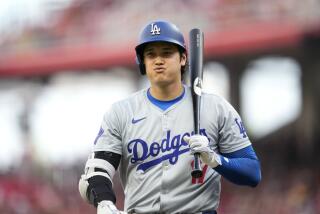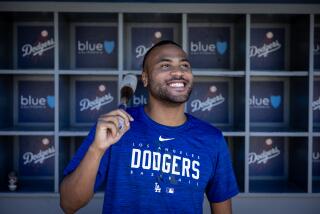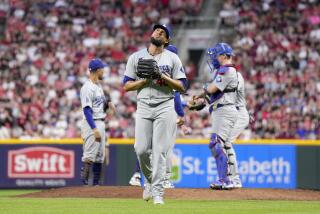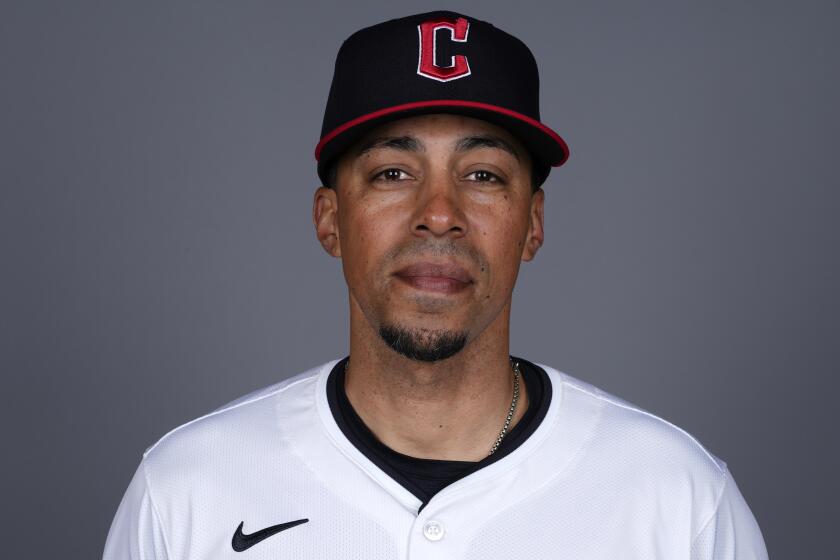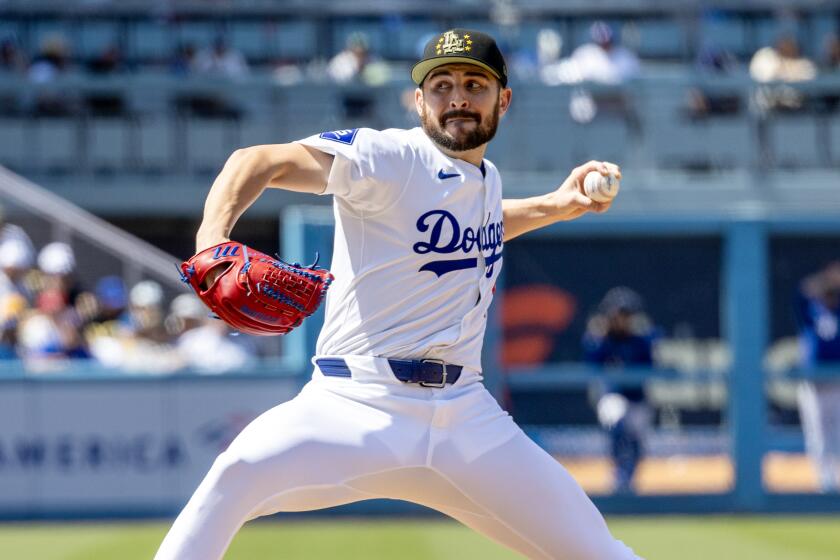Out of the blue, Fernando’s back
Twenty-two years after his opening-day emergency start for the Dodgers, a 2-0 shutout over the Houston Astros, Fernando Valenzuela is a rookie again.
He sits in Dodger Stadium and pans the field with binoculars. During the bottom of the seventh inning in a home game against the Colorado Rockies, he bobs his head as the crowd sings mass karaoke to “Take Me Out to the Ballgame.”
But Valenzuela is not on the field. Mexico’s finest beisbol export, the man who sparked Fernandomania when he helped the Dodgers capture the World Series title in 1981 -- the same season he nabbed the Cy Young Award -- is perched high above home plate in a radio booth. Wired with a headset and microphone, he is sandwiched between announcers Jamie Jarrin, a Hall of Fame broadcaster marking his 45th season in the booth, and Pepe Yniguez, a former radio reporter who teamed with Jarrin six years ago. All three men are paid by the Dodgers organization to banter about baseball on KWKW-AM (1330), a Spanish-language radio station that, in turn, pays for the rights to broadcast the games.
Nearby, producer Michael Noto guides the men through the 2 1/2-hour show, including commercial breaks that declare, “Yo quiero una Bud Light.”
Jarrin turns to Valenzuela: “Fernando, there are 30,416 people here tonight. What do you think of that?”
Valenzuela: “I was pretty close, Jaime. I guessed 30,000.”
Yniguez: “You’re good at this.”
Valenzuela: “Remember, guys, I was here for 10 years. And while I didn’t count all the people out there every night, I saw them. I saw them all.”
He saw them all for 10 years. Then, in 1991, he was put on waivers 11 days before the start of the season. Valenzuela continued to play in the majors through 1997 and spent the next four years in the Mexican winter league, but there were always rumors about his bitterness toward the Dodger organization. He wouldn’t participate in any efforts to pay tribute to his career, or so the stories went. “I don’t know if you remember all those things that happened between me and the Dodgers,” he says, recalling his split with the organization after he was let go by then-Manager Tommy Lasorda. “All the media was talking about how we were not friends, not together anymore. It was nothing like that. It wasn’t the Dodgers against me or me against the Dodgers. I received a lot of invitations to come to the games, but I wanted to stay away from baseball for a little while.”
His wife convinced him to invest in real estate. “And I played golf,” he says, laughing about his second-favorite sport. “I play in the morning, and I play at different golf courses. That keeps me busy. I never took lessons or practiced. My game is not good. But, you know, it’s a sport too. Baseball, for me, besides being the sport I love to play, was my job. So I took baseball seriously. With golf, I do it to relax, to meet people. That’s the fun part.”
Valenzuela, 42, smiles broadly, working in a booth the size of a closet, reading game notes and stats. The 1981 National League rookie of the year who was once known for his signature screwball is a Dodger again, still idolized by fans and still an expert on the sport that brought him international acclaim.
Yes, he admits, he has a lot to learn about broadcasting. But, hey, it’s all a matter of practice, he says, and timing -- like knowing when to jump in after a play-by-play description from Jarrin or Yniguez. His contract requires him to work only from the top of the second inning to the bottom of the seventh. (He jokes: “Besides, I never pitched more than six.”) Still, he usually hangs around until the finish, mingling with pals and fans while on his way out.
At one point during the evening, after Hideo Nomo hits a fly ball and is called out, Valenzuela offers insight into Dodger Rickey Henderson at bat.
Jarrin: “What is a player thinking about as they prepare to bat?”
Valenzuela: “It gives you time to think about what you’re going to do, you know. It’s a good thing to have a little bit of down time before you go up to the plate. Sometimes the pitcher will throw a perfect pitch, but then a batter will also hit a perfect pitch. That’s how it goes.”
When he’s not golfing, the native of Navajoa, Sonora, Mexico, confesses to being a homebody at his Los Feliz ranch-style house, spending time with Linda, his wife of 21 years, and their four kids, including the eldest, Fernando Jr., 20, a first baseman with the Eugene (Ore.) Emeralds and who in June was drafted by the Padres.
“I don’t think I was born to talk,” Valenzuela told Jarrin and Yniguez when he started his broadcast gig. But Jarrin, who was Valenzuela’s interpreter at news conferences during the 1981 season and has remained a close friend, has a different take on Valenzuela’s new career.
“Fernando had to be back with the Dodgers, with the family,” Jarrin says. “Like Sandy Koufax, he is a recognizable name. And besides, we are getting new listeners -- females!”
Yniguez remembers asking Valenzuela what made him more nervous, throwing that first pitch or his first time behind the microphone. “He told me, ‘When they gave me the ball I knew what to do. I don’t know what to do with the microphone. You have to teach me.’ ”
They have. Listen as Valenzuela expounds about Nomo on the mound, getting a grueling workout by Rockies batters: “The Rockies are making Nomo work hard. He’s using the fast ball, the breaking ball, his whole repertoire.” Valenzuela’s voice, usually a monotone, gets louder, even excitable. Jarrin and Yniguez lean in, smiling, nodding, encouraging Valenzuela to continue.
“Nomo’s a very smart pitcher, and he’s very successful on the mound tonight,” says the man who inspired thousands of bobblehead dolls. “He’s making an adjustment on every pitch and with every hitter. He’s a warrior!”
Valenzuela says his return in many ways is about reconnecting with the fans.
“Now I get to come to the park and talk about the game I love,” he says, turning to face the field, talking to it. “There’s lots of memories out there. But you know what the funny thing is?” He pauses, almost as if deciding which pitch to propel next.
“I’m a rookie. I’m a rookie all over again.”
More to Read
Are you a true-blue fan?
Get our Dodgers Dugout newsletter for insights, news and much more.
You may occasionally receive promotional content from the Los Angeles Times.
